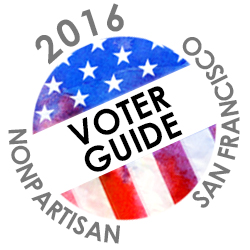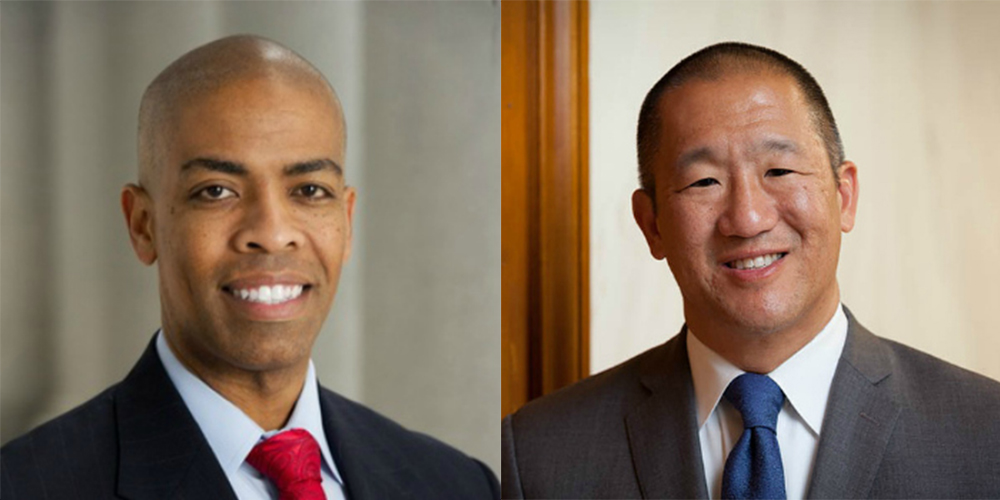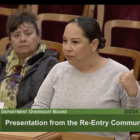Campaign donations highlight the ethical pitfalls inherent in judicial elections, a widely questioned practice
Nearly a third of the campaign contributions in Tuesday’s election for Superior Court judge come from San Francisco’s legal community, including prosecutors and interim Police Chief Toney Chaplin.
Some of these donors can expect to someday appear before the winning judge, raising concerns about potential conflicts of interest or bias — or just the appearance of impropriety, which judges are under clear direction to avoid.
This occurs against the backdrop of a national debate about the merits of electing judges. These donations are not illegal, but they raise questions echoed by legal scholars and a former U.S. Supreme Court justice about whether elections are the best way to select judges.
 Both candidates — Victor Hwang and Paul Henderson — have worked as prosecutors in the District Attorney’s Office. Hwang, a member of the city’s Police Commission and a civil rights attorney with Asian Pacific Islander Legal Outreach, began his career as a public defender before leading the DA’s hate crimes and human trafficking unit. Henderson was a trial attorney and chief of administration for the district attorney before Mayor Ed Lee named him his deputy for public safety.
Both candidates — Victor Hwang and Paul Henderson — have worked as prosecutors in the District Attorney’s Office. Hwang, a member of the city’s Police Commission and a civil rights attorney with Asian Pacific Islander Legal Outreach, began his career as a public defender before leading the DA’s hate crimes and human trafficking unit. Henderson was a trial attorney and chief of administration for the district attorney before Mayor Ed Lee named him his deputy for public safety.
Of the $161,262 contributed to date by 310 donors to Hwang, an early supporter of Lee, $44,945 came from 121 attorneys, according to campaign finance records.
In addition, Hwang has contributed $85,000 to his campaign. He said another superior court judge told him “expect to spend $100,000 on your own race.”
For Henderson, 159 of his 398 donors identified themselves as lawyers, and they contributed more than $45,000 to his total $131,227.
His campaign haul also includes $3,850 from 24 of his former colleagues at the District Attorney’s Office.
Another notable contributor is Chaplin, who gave Henderson $250. Though a small amount, it represents a nod from the city’s most powerful cop, who was appointed interim chief by Lee. Henderson also received money from Len Broberg, the Gang Task Force’s go-to expert on African-American street gangs, as well as other police officers.
Chaplin is vying to retain his position — Hwang and his fellow police commissioners are due to recommend a permanent police chief to Lee — and it is unclear if Chaplin is on their short list. In any event, chances are slim that he would ever be called to testify in a case in Superior Court, unless he personally makes a street-level arrest. But other police officers are summoned to Superior Court on a daily basis to testify.
Chaplin could not be reached for comment. Spokespersons for District Attorney George Gascon and Public Defender Jeff Adachi declined to comment about the potential ethical pitfalls of a race where the candidates are funded in part by these offices’ attorneys, who frequently spar with each other and police in Superior Court.
The rest of Hwang and Henderson’s contributors include retirees in their families, figures in local business and government, and movers in San Francisco political circles. Everyday San Franciscans who might regularly appear before the winning judge in criminal, civil, small-claims, traffic and family court, are less prevalent in campaign finance records.
Henderson’s biggest single donation, $10,000, came from George Hall, an executive with a Sacramento-area chain of assisted-living facilities. Henderson also received a total of $9,000 from two San Francisco medical cannabis dispensaries.
Hwang received a total of only $300 from two assistant district attorneys. But he did collect $15,000 from attorneys at big law firms involved in high-profile litigation. None of those firms would likely appear before him in Superior Court.
The candidates themselves insist the likelihood they would be influenced by a campaign contribution is minuscule. For Hwang, the average contribution from a lawyer was $367, and for Henderson it was $283.
“My career is worth more than that,” Henderson said.
He acknowledged that the public might perceive a “potential” for undue influence or impropriety, “but you can’t make the presumption. It’s just not substantive enough.”
Still, any level of attorney contributions is enough to sour judicial elections for many legal experts — and, it seems, in the eyes of the public.
An insider’s game
There is a mundane reason why attorneys make up a significant slice of the judicial candidates’ donors. It is not because the candidates have solicited them for cash, or because the lawyers hope to influence future decisions. It is because few others appear to care.
“Who else is going to be interested in these elections?” said David Levine, a law professor at UC Hastings College of the Law. “By and large, it’s going to be the people who deal with these judges day in and day out.”
Both candidates admit that beyond their personal and professional circles — many members are, as you would expect, lawyers — it is hard to raise awareness of the existence of their election, let alone raise money.
“The number one question I hear is, ‘Judges are elected?’” Hwang said.
As for public outcry over this system? It is nonexistent, he said.
“Nobody understands judicial elections in the first place,” Hwang said, “so nobody’s gotten to the level of concern about the donors.”
Voters not involved with the legal system have a few excuses for being disengaged. First, judicial races are rare.
In California, judicial elections are prescribed by the state constitution. Superior Court judges are elected to six-year terms, with no term limits. However, sitting judges only appear on voters’ ballots if there is a challenger.
There have been three contested judicial races in San Francisco since 2008, making an elected judge possibly one of the safest incumbent political offices. And if a judge retires or dies in the middle of his or her term, a replacement is appointed by the governor.
Henderson and Hwang, the top two finishers in a three-judge June primary, are on the ballot only because a judge retired at just the right time to trigger an election.
Widespread criticism of judicial elections
Numerous scholars agree that something is wrong when lawyers’ monetary contributions dominate in judicial races.
Indeed, “anyone who has thought about this thinks judicial elections are terrible,” Levine said.
A 2011 survey revealed that 76 percent of voters believe campaign contributions affect judges’ decisions “in some way.” And regardless of whether that is true, the state legal system has recognized that perceived impropriety is itself problematic.
Under the California Code of Judicial Ethics, judges are supposed to avoid at all costs the “appearance of impropriety.” And Levine said that when so many lawyers give to judges the result is, at the best, very bad optics.
“At the minimum, there is an appearance problem,” he said.
For these reasons, the U.S. Supreme Court has upheld the right of states to limit a judge or judicial candidate’s ability to solicit campaign funds.
In its 2015 ruling, for Williams-Yullee v. Florida Bar, the court recognized that Florida had “reasonably determined that personal appeals for money by a judicial candidate inherently create an appearance of impropriety that may cause the public to lose confidence in the integrity of the judiciary” (emphasis added).
“Simply put,” the court wrote, “the public may lack confidence in a judge’s ability to administer justice without fear or favor if he comes to office by asking for favors.”
However, the court also found that if you are going to have elected judges, those judges need to be able to raise money.
“One cannot have judicial elections without judicial campaigns, and judicial campaigns without funds for campaigning, and funds for campaigning without asking for them,” the court found. “A Court that sees impropriety in a candidate’s request for any contributions to his election campaign does not much like judicial selection by the people.”
And there are safeguards to prevent a judge from making a biased ruling in a case, including requiring a judge to disclose campaign contributions, recusing himself or herself and a lawyer’s ability to replace a judge for any — or no — reason.
Judges are state officials, which means San Francisco’s campaign contribution limit of $500 per person does not apply. As it happens, there is no limit on judicial contributions at all, though the California Judges Association notes that a contribution limit specific to attorneys has been suggested, “to minimize the risk that the contribution will have the appearance of impropriety.”
The state Supreme Court has made it clear that it understands the potential ethical perils associated with the practice. In 2012 the state’s justices amended the court’s Code of Judicial Ethics, disqualifying appellate justices from cases where an attorney who contributed $5,000 or more to that justice’s campaign appears before them.
California could impose limits on attorney contributions, but it does not appear that this much-maligned system will change any time soon. Altering or eliminating judicial elections would mean amending the state constitution, which requires either two-thirds approval by both houses of the Legislature, or by a majority of voters through the petition process.
Alternative systems, and their complications
Former United States Supreme Court Justice Sandra Day O’Connor has led efforts to convince state courts to scrap judicial elections altogether, calling them “tawdry and embarrassing.”
But what are the alternatives to judicial elections?
In other states, and for higher benches in California, judges are appointed: by the governor for state courts and by the president for federal courts. Here, the same problems arise. Presidents and governors are elected and take campaign contributions. There is no assurance for the public that politics and political patronage are taken out of the equation.
In those cases, the governor’s “appointments secretary comes up with the names — and who knows where they come from?” Levine said.
One would be to create a system where judicial elections rely entirely on public financing — though giving candidates of vastly different qualifications equal financing creates its own set of issues.
Another would be to emulate New York State’s selection process for appellate justices, Levine said: legal experts, like the members of a local bar association, select a screening panel that then assembles a “short list” of “well-qualified candidates,” and the governor may pick a judge only from that list.
“You can’t get rid of politics entirely,” Levine admitted, “but that’s at least close to a decent system.”










